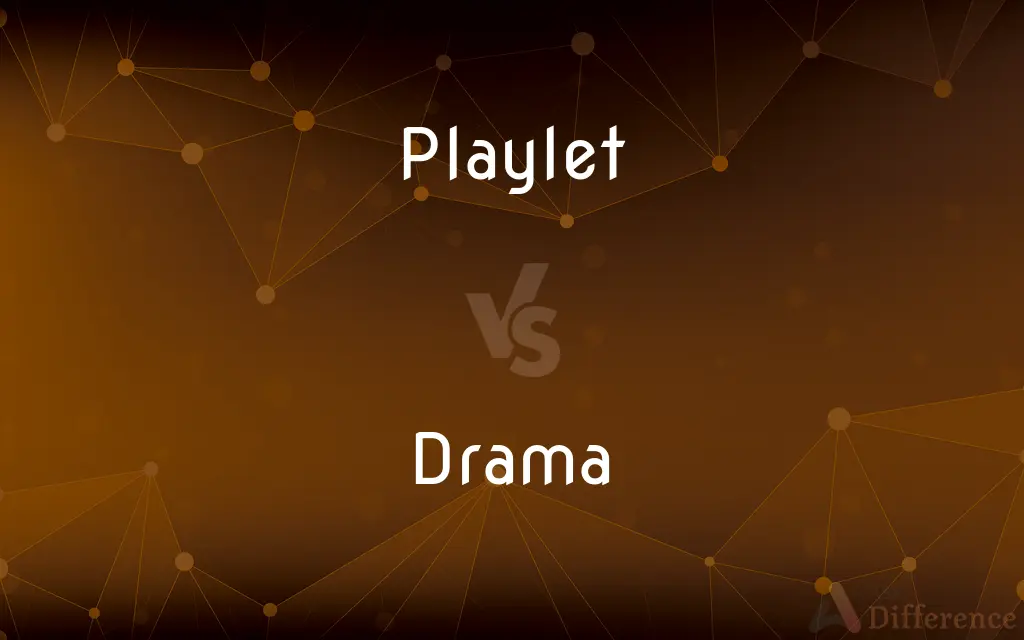Playlet vs. Drama — What's the Difference?
By Urooj Arif & Fiza Rafique — Updated on March 2, 2024
A playlet is a short, simple play, often focusing on a single situation or theme, while drama is a broader genre of literature or performance art encompassing plays of varying lengths and complexities.

Difference Between Playlet and Drama
Table of Contents
ADVERTISEMENT
Key Differences
A playlet, by its nature, is designed to be brief, usually lasting no more than a few minutes to an hour. It typically focuses on a concise narrative or explores a singular theme or situation with a limited set of characters. Whereas drama, as a genre, includes works ranging from short one-act plays to elaborate multi-act productions, encompassing a wide array of themes, characters, and narratives, from the simplistic to the complex.
While playlets are often utilized in educational settings or as part of a larger presentation due to their brevity and focused content, dramas are found in both educational and professional theater environments, offering a depth of exploration into human experiences, emotions, and conflicts that can span various acts and time frames.
The structure of a playlet is straightforward, with a clear and direct storyline, making it accessible for audiences of all ages and backgrounds. On the other hand, dramas may employ complex narratives, character developments, and thematic explorations, requiring a more engaged and sometimes interpretative audience participation.
Playlets require minimal staging, props, and costumes, reflecting their simplicity and ease of performance. Dramas, however, can range from minimalistic settings to elaborate productions with intricate designs and technical requirements, depending on the scope of the work.
Despite their differences, both playlets and dramas serve as important mediums for storytelling, emotional expression, and cultural commentary, each fitting different contexts and audiences based on their format and content.
ADVERTISEMENT
Comparison Chart
Length
Short, typically under an hour
Can vary widely, from short to full-length
Focus
Single situation or theme
Broad, multiple themes and narratives
Characters
Limited number
Can vary from few to many
Narrative Complexity
Simple and straightforward
Ranges from simple to complex
Production Needs
Minimal staging, props, and costumes
Ranges from minimal to elaborate
Setting
Often singular and uncomplicated
Can be diverse and complex
Audience
Broad, suitable for all ages
Depends on the complexity of themes
Purpose
Educational, entertainment in a concise format
Exploration of human experience, entertainment
Compare with Definitions
Playlet
Limited characters.
A playlet involving just two characters stranded on a deserted island.
Drama
Complex character development.
A drama where the main character undergoes significant personal growth.
Playlet
Simple narrative.
A playlet focusing on the theme of honesty in a school setting.
Drama
Broad genre of performance art.
A drama exploring complex family dynamics over three acts.
Playlet
Minimal production needs.
A playlet performed with just a table and chairs as props.
Drama
Diverse themes and narratives.
A drama intertwining themes of love, betrayal, and redemption.
Playlet
Educational or thematic focus.
A playlet used in a workshop to highlight effective communication skills.
Drama
Elaborate production possibilities.
A drama with intricate set designs representing different time periods.
Playlet
Short play.
A 10-minute playlet depicting a humorous misunderstanding between friends.
Drama
Drama is the specific mode of fiction represented in performance: a play, opera, mime, ballet, etc., performed in a theatre, or on radio or television. Considered as a genre of poetry in general, the dramatic mode has been contrasted with the epic and the lyrical modes ever since Aristotle's Poetics (c.
Playlet
A short play.
Drama
Theatrical plays in general
Playlet
A short play (dramatic work).
Drama
Dramatic composition and the literature pertaining to or illustrating it; dramatic literature.
Drama
A dramatic work intended for performance by actors on a stage;
He wrote several plays but only one was produced on Broadway
Drama
The literary genre of works intended for the theater
Drama
Variable length and complexity.
A one-act drama that delves into the psyche of its protagonist.
Common Curiosities
Can a playlet be considered a type of drama?
Yes, a playlet is a subset of drama, characterized by its short format and concise storytelling.
What distinguishes a playlet from other forms of drama?
A playlet is distinguished by its brief duration and focused content, often with minimal staging requirements.
Why might someone choose to write or produce a playlet?
Playlets are chosen for their simplicity, ease of production, and effectiveness in conveying a message or theme quickly.
How does the audience's experience differ between a playlet and a drama?
Audiences may find playlets more accessible and straightforward, while dramas can offer a deeper, more immersive exploration of themes and characters.
Can dramas include multiple playlets?
Yes, a drama production can include multiple playlets, each contributing to the overall theme or narrative.
Are playlets only for beginner writers or audiences?
No, playlets can be written and enjoyed by individuals at all levels of experience, serving various educational and entertainment purposes.
Is the length the only difference between a playlet and a drama?
Length is a primary difference, but complexity, character development, and production scale also distinguish playlets from broader dramas.
How do production costs compare between playlets and dramas?
Generally, playlets require lower production costs due to their shorter length and simpler staging needs compared to more elaborate dramas.
Can playlets be effective in professional theater?
Yes, playlets can be effectively used in professional theater, often as part of festivals or as a means to showcase emerging talent.
Do playlets and dramas require different writing skills?
Both forms require strong storytelling skills, but writing for playlets may emphasize conciseness and clarity, while dramas might require more skill in developing complex narratives and character arcs.
How do actors prepare differently for playlets versus dramas?
Preparation for playlets may focus on quick character development and timing, while dramas often require deeper character immersion and sustained performance.
Can the themes of playlets be as diverse as those of dramas?
While playlets can explore a wide range of themes, dramas offer the scope to delve into these themes more deeply and complexly.
What role do playlets play in education?
Playlets are often used in educational settings to teach concepts, provoke discussion, or illustrate situations in a memorable and engaging way.
How does the setting influence the impact of a playlet or drama?
The setting, whether simple or elaborate, can significantly affect the audience's immersion and the story's believability in both playlets and dramas.
How has the popularity of playlets and dramas evolved over time?
The popularity of both forms has fluctuated, with current trends favoring diverse formats and platforms, from traditional theater to online streaming, allowing both playlets and dramas to reach wider audiences.
Share Your Discovery

Previous Comparison
Resale vs. Retail
Next Comparison
Cafe vs. CafAuthor Spotlight
Written by
Urooj ArifUrooj is a skilled content writer at Ask Difference, known for her exceptional ability to simplify complex topics into engaging and informative content. With a passion for research and a flair for clear, concise writing, she consistently delivers articles that resonate with our diverse audience.
Co-written by
Fiza RafiqueFiza Rafique is a skilled content writer at AskDifference.com, where she meticulously refines and enhances written pieces. Drawing from her vast editorial expertise, Fiza ensures clarity, accuracy, and precision in every article. Passionate about language, she continually seeks to elevate the quality of content for readers worldwide.














































